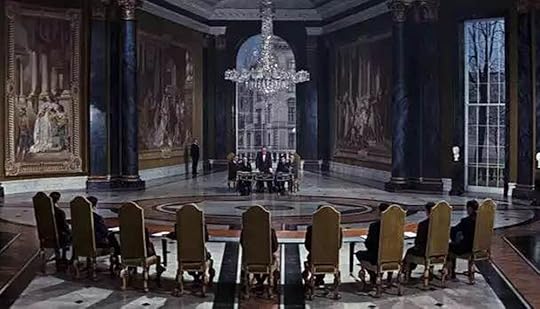You’d Better Give Me What I’ve Never Had: Some Thoughts on Nostalgia, Paranoia and Ontic Shock

Nostalgia and paranoia describe two different strategies for avoiding a confrontation with a fundamental loss. In nostalgia, the individual fantasies that there was some previous time in which things were fulfilling and satisfying. Whether the individual idealizes childhood, a previous relationship, or a supposed Golden Era in history the general structure involves imagining a type of lost Eden. It is fueled by the sense that something substantial, something that provided an ultimate plenitude and enjoyment, has disappeared in the sands of time. While conservative political and religious groups rely on this notion of a lost Eden, it is also present in the political and religious left.
Nostalgia is one of the strategies individuals and groups use to avoid confronting the idea that what they feel they have lost never really existed in the first place. This non-existent object that we want to regain is, from a psychoanalytic perspective, formed as we become human subjects. Our genesis is inextricably linked to an illusion concerning a lost object, an illusion that has a fundamental effect on our existence (something I have explored in The Idolatry of God).
The fantasy that we are seduced by can be described like this,
An original wholeness
A fall from that wholeness
A possible future in which we recover that wholeness
Yet what undergirds this fantasy is the following,
A sense of loss
A fantasy about an object that we have been separated from
A fantasy about being able to reclaim that lost object
In other words, the Fall comes first and generates that idea that there was a pre-fall state. An idea that causes us to desire a return to that state. The problem with this is that the only enjoyment one can get from the nostalgic position derives from not bringing back what one thinks one has lost. It is a melancholic enjoyment that revels in fantasizing about a past that never existed, a past that can never be brought back.
Things may well have been better at some previous stage in our lives, but nostalgia is fueled by the fantasy of an impossible past, a past where things truly offered fulfillment. If an individual or community is able to actually get back the Golden Era they feel they’ve lost, they are confronted with the fact that it doesn’t give what the imagined. For example, if the conservative is able to impose “traditional” forms of marriage onto society, then they are faced with the disturbing fact that this doesn’t solve the antagonisms related to intimate relationships. They are brought face to face with what Paul Tillich called “ontic shock” (the trauma of confronting our existential position). Thus the nostalgic strategy is always doomed to fail.
Another flawed strategy employed to avoid this ontic shock is that of paranoia. In paranoia the individual or community doesn’t locate the loss of their enjoyment in the past, but in an other. In this way paranoia is often more destructive that nostalgia, for while nostalgia is more internal, the one who is paranoid has an obstacle to blame for their present state of suffering.
Politically speaking, the paranoid structure is marked by those who believe that there is a vast, well-organized conspiracy at work behind some contingent, chaotic set of events. Some kind of illuminati exist, meeting in smoked filled rooms, controlling things and pulling the strings. The basic example of this paranoid strategy is fascism. Here the fantasy of a Jewish conspiracy is operative. Behind all the seemingly diverse monetary and media institutions, a small group of Jews are in control; manipulating world affairs to their advantage. All kinds of diagrams are created to show how diverse things are linked together.
All paranoid structures replicate this basic logic. Again it is a strategy intimately linked with conservatism, but is again prevalent also on the left. For instance many on the left are fueled by the idea that there are a few people in control who are responsible for all sorts of political events and terrorist activities. The terrorist organization SPECTRE in the James Bond franchise plays into this fantasy, offering the viewer a super-organization secretly in control of everything: toppling governments, instating dictators, assassinating politicians and deciding the fate of whole nations.
The paranoid individual is one who can’t help but obsessively blame some other for their suffering. The more that the other is seen to be enjoying their life, the more angry and bitter the paranoid individual becomes. Ultimately they seek to destroy the other, attempting to disrupt their life and evoke their suffering. While also attempting to draw others into the delusion. The unconscious claim is that the other has stolen my enjoyment, that they have robbed me of my pleasure.
In this way they are able to obfuscate the reality of their lack and blame another for their suffering. They are able to avoid their ontic reality by fantasizing about a non-suffering state effectively walled off by the other. The paranoid individual obsessively attacks the object of their hate and attempts to draw them into the fantasy.
The problem again is that the strategy ultimately fails by keeping the individual from facing their symptoms and learning how to accept them. Whether at an individual, political or religious level, neither nostalgia nor paranoia can succeed in covering over our fundamental condition. Instead we must find ways to face it and integrate it. Here is a link to a talk in which I touch on some of these issues.
These thoughts are directly inspired by my reading of Enjoying What We Don’t Have by Todd McGowan. I highly recommend the book if you’d like to explore these ideas in more depth.
Peter Rollins's Blog
- Peter Rollins's profile
- 314 followers



